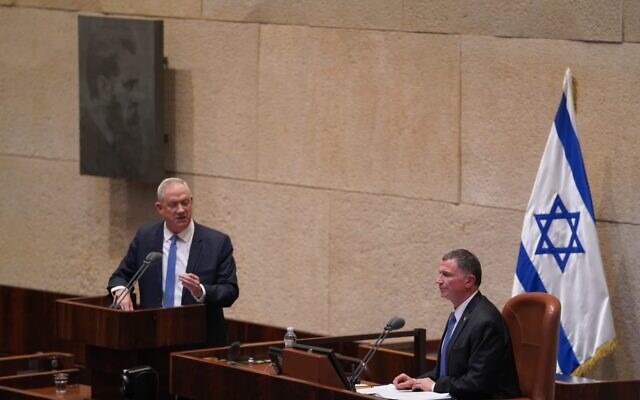Israel’s canny caretaker prime minister, Benjamin Netanyahu, can thank the coronavirus and a weary, beaten-down opponent for having saved his political skin.
Netanyahu’s dominance of Israel politics seemed to have ended in mid-March as Blue and White Party leader Benny Gantz moved closer to forming a coalition government. But in a stunning 180 degree reversal on March 26 that captivated a nation in the grip of a pandemic, Gantz accepted Netanyahu’s invitation to serve in a national emergency government that he, Netanyahu, would lead for the next year-and-a-half.
“These are unusual times and they call for unusual decisions,” said Gantz in justifying his startling volte face, which enraged and disillusioned colleagues and supporters. “This is not a time for infighting and mudslinging. This is the time for responsible committed, patriotic leadership. Let us join hands and get Israel out of this crisis.”

Through the course of three inconclusive elections since last April, Gantz was adamant in his insistence that he would not serve with a prime minister who has been indicted on criminal charges of fraud, breach of trust and bribery and who is scheduled to go to trial in May.
Gantz kept faith with this promise after being tasked by President Reuven Rivlin on March 16 to form a government. With momentum on his side and with critics accusing Netanyahu of exploiting the coronavirus crisis for political advantage, Gantz assured Israelis he would cobble together a “patriotic,” broadly-based government dedicated to eradicating the coronavirus and the “virus of schism and hatred.”
And with the backing of a slim majority in parliament, Gantz appeared ready to pass legislation that would have ended the Netanyahu era by imposing a two-term limit on the length of a prime minister’s service and by preventing an indicted politician from establishing a government.
Gantz had a fairly reasonable chance of succeeding, considering that the centrist Blue and White Party had won 33 seats in the March 2 election and that it had the backing of the center/left Labor Party, the centrist Gesher Party, the leftist Meretz Party, the rightist Yisrael Beytenu Party and the Arab Joint List. Taken together, he could count on a bare majority of 61 Knesset seats.
Gantz’s calculations unravelled after three members of his informal coalition — two from Blue and White and one from Gesher — said they could not work with a government dependent on the outside support of the Arab Joint List, three of whose 15 representatives favor a binational state in place of Israel. Netanyahu and his right-wing Likud Party brazenly exploited these divisions by questioning the loyalty of the Arab Joint List and by accusing it of supporting terrorism.

Yair Lapid, one of the leaders of the Blue and White Party and Netanyahu’s former finance minister, defended its plan to form a government propped up by the Arab Joint List, saying it was the only way to break the year-long political impasse, get rid of Netanyahu, and avert a fourth election.
It’s questionable, however, whether the Arab Joint List was entirely on board, given its demands in exchange for its cooperation. Ayman Odeh, one of its leaders, said that Gantz would have to retract his comments concerning the necessity of forming a “Jewish majority” government. And Odeh’s colleague, Mtanes Shihadeh, demanded the annulment of discriminatory laws and the Nation State Law, which ratifies Israel’s status as a Jewish state.

In light of these factors, Gantz’s chances of forming a government was less than assured. Despite these very real difficulties, Gantz could at least have assembled a coalition to pass two basic laws blocking Netanyahu from ever serving in office again.
The Likud Speaker of the Knesset, Yuli Edelstein, attempted to sabotage Gantz’s strategy. Rather than complying with a Supreme Court order that would have permitted the selection of a successor from the ranks of the Blue and White Party so as to facilitate the passage of this landmark legislation, he resigned, thereby creating a constitutional crisis and howls of protest. Edelstein, Netanyahu’s close ally, was roundly rebuked by Rivlin and the Chief Justice for his naked partisanship and his utter disdain of democracy and the rule of law.
As these unsettling events unfolded, Netanyahu continued to press Gantz to join him in governing the country. On March 19, with the coronavirus exacting a significant social and economic toll on Israel, Gantz said he could not in all conscience rule out the prospect of serving in a government led by Netanyahu. As he put it, “At the moment all options need to be on the table.”
Netanyahu exerted still more pressure on Gantz by underscoring the existential dangers posed by the contagion, which has virtually shut down Israel. “Together, we will fight to save thousands of citizens,” he declared.

Offering to share power on an equal basis with Gantz for three years, Netanyahu insisted on serving as prime minister for the first 18 months, with Gantz then taking over. Netanyahu also issued an ultimatum, warning that if the Blue and White Party nominated its candidate, Meir Cohen, as Knesset Speaker, he would pull the plug on talks for a national unity government.
Netanyahu’s offer, generally cloaked in a mantle of selflessness and national necessity, was self-serving, of course.
Netanyahu’s success in coopting Gantz will defuse the threat of an alternative government headed by the Blue and White Party. It will enable Netanyahu to secure a record fifth term. And it will place him in a better position to gain leverage in negotiating a plea agreement to fight off charges of corruption and to greatly reduce his chances of being sent to prison.
Whatever happens in the days ahead, Netanyahu has already succeeded in dismantling the Blue and White Party, an amalgamation of three parties: Gantz’s Israel Resilience Party, Lapid’s Yesh Atid Party, and Moshe Ya’alon’s Telem Party. In addition, Netanyahu appears to have neutralized his arch nemesis, Avigdor Liberman, the leader of the Yisrael Beytenu Party, who until very recently held the balance of power.
To no one’s surprise, Lapid and Ya’alon have savagely attacked Gantz, having accused him of shameless betrayal, gross disloyalty, rank opportunism, craven surrender and a disgusting disregard for the wishes of the approximately one million voters who cast their ballots for him and the Blue and White Party in three highly contested elections. While Lapid and Ya’alon have gone into opposition, Gabi Ashkenazi, one of the principals of the party, has joined Gantz in his new venture.
Gantz, who in the meantime has assumed the position of Knesset Speaker, is unrepentant. Defending himself on March 27, he claimed he was “at peace” with his head-spinning decision “to explore the formation of a national emergency government.”
“I am more at peace today than ever,” he wrote in a Facebook post. “I am at peace because I did what my nation needs. These are unusual times. Israel is in a state of emergency. Hundreds of thousands of families are hunkering down in their homes. There is a real sense of emergency in the face of a health threat that is taking human life and in the face the threat of economic devastation. This is the time for leaders to choose what is right and put the lingering issues and personal scores aside.”

In all likelihood, Gantz’s Israel Resilience Party will join a Likud-led government composed of far-right and ultra-Orthodox parties: Shas, Yemina and United Torah Judaism. Speculation abounds that the Labor Party and the Gesher Party may yet be part of this coalition.
On March 28, Netanyahu said that Israel was “on its way to a unity government,” and that a “joint effort” was required to “defeat the coronavirus.”
